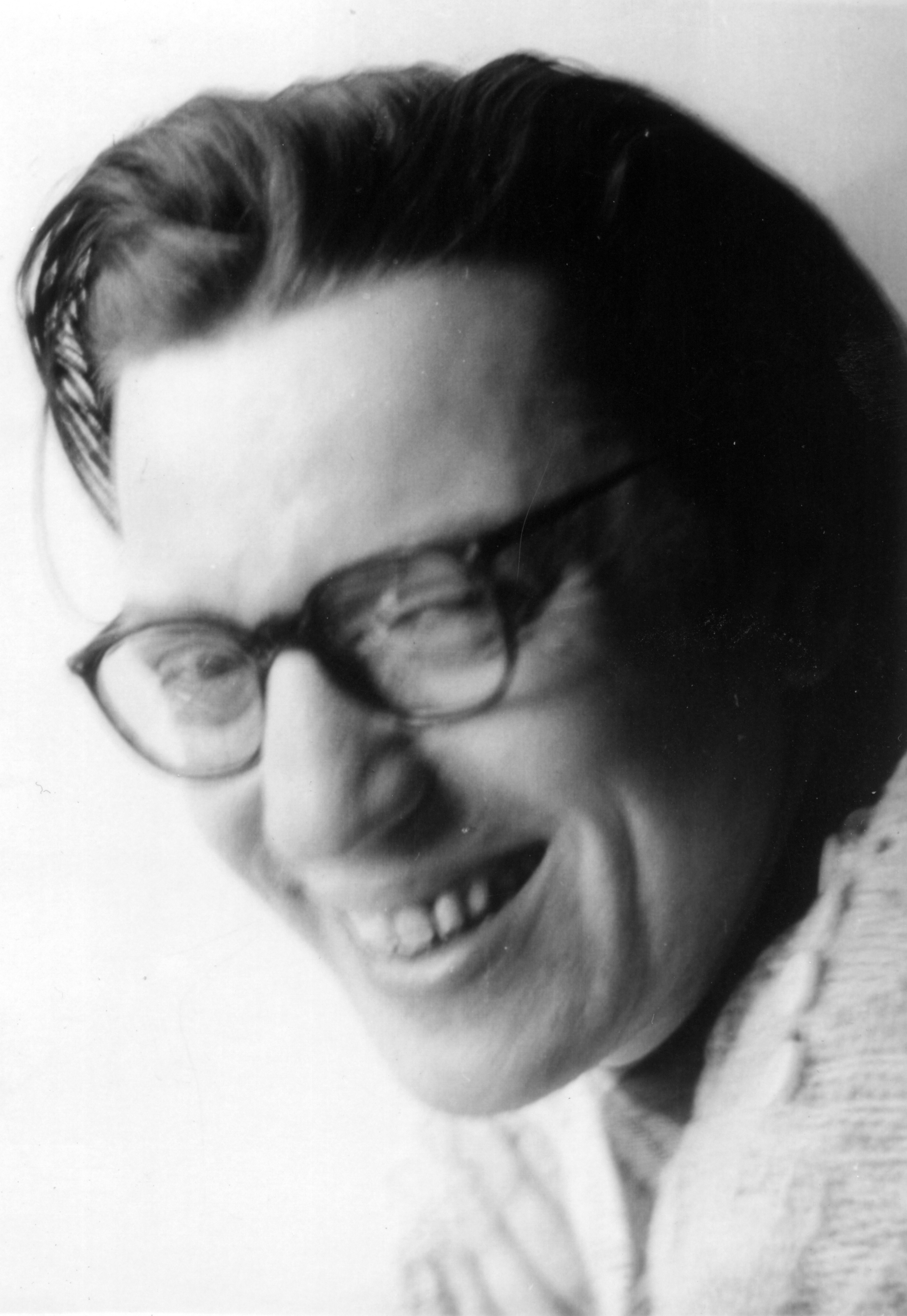
Bernd Alois Zimmermann
Upcoming Performances
About Bernd Alois Zimmermann
It is of greater significance that Zimmermann possessed a much higher differentiated musical perception and awareness than most of the composers of his time, that he was able to compose intensively ‘heard-through’ cantilenas and that he had a highly sensitive feeling for when to stand still and then continue, when to pause, when to surprise and when to consolidate. (Karlheinz Stockhausen)
Bernd Alois Zimmermann was born on 20 March 1918 in Bliesheim near Cologne. He attended the Salvatorianer College Steinfeld in der Eifel from1929 to 1936. After having passed his Abitur [higher education entrance examination], he initially commenced a primary teacher training course in 1937, but shortly thereafter transferred to the Hochschule für Musik in Cologne to study school music, music theory and composition with Heinrich Lemacher and Philipp Jarnach. In 1939, Zimmermann was drafted into military service and returned from the front three years later due to illness. He then completed his musical studies in 1947 with the music teacher examination. In 1948, Zimmermann first attended the Darmstadt Summer courses for new music, coming into contact with Wolfgang Fortner und René Leibowitz; at the same time, his Concerto for Orchestra (2nd version 1948) was first performed in Darmstadt. For financial security, Zimmermann arranged light and film music in the 1950s and composed music for school radio programmes. Zimmermann was elected as the president of the German section of the IGNM in 1956, but relinquished the post a year later after having been unsuccessful in uniting the composers of the older and younger generations. In the early summer of 1957, he was the first German composer to receive a scholarship for the Villa Massimo in Rome where he began work on the opera Die Soldaten. From 1957 onwards, he supervised a composition class and seminar for film and radio music at the Musikhochschule in Cologne. The composer devoted the final years of his life to work on the Requiem for a young poet which was given its first performance in 1969. On 10 August 1970, Zimmermann took his own life in Groß-Königsdorf near Cologne.
Although the size of his musical oeuvre is relatively small, Zimmermann occupies a key position in the history of German post-war music. He not only immersed himself in serial music and the strict concept of the Darmstadt avant-garde, but also combined these influences in a highly original manner with elements of jazz and quotations from historical compositions, thereby intriguingly anticipating the core concepts and techniques of so-called post-modernism. Zimmermann’s oeuvre includes compositions for orchestra - a Symphony (2nd version, 1953), a variety of ballet works and solo concertos - vocal works, chamber music and solo literature and electronic magnetic tape music. The Requiem for a young poet (1967/1969) can be viewed as a showcase for Zimmermann’s compositional development. The work is scored for large-scale forces including narrator, soloists, three choirs, electronic sounds, orchestra, jazz combo and organ. The texts selected by the composer range from political speeches, reports and liturgies to poems by Majakowski, Joyce, Pound, Camus, Schwitters und Bayer. The boundaries of the oratorio are pushed back towards the direction of radio play, reportage and features.
Zimmermann developed the concept of “pluralistic tonal composition” with the Sonata for cello solo (1960) and the Dialogues for 2 pianos and orchestra (2nd version, 1965). The superimposition of a variety of metres and rhythms produces a box form with differing time levels; quotations were also added. In the opera Die Soldaten (1957-1965), the technique of simulation was the central starting point (“sphericity of time”). The literary text, the play by J.M.R. Lenz, already splits open the unity of space and time: the various plot lines run parallel to each other. Zimmermann left the text of the play almost unaltered – elements of the text are additionally superimposed in a collage technique. The planned first performance of Die Soldaten in 1960 was initially postponed as the work was considered to be unplayable. The opera finally experienced its premiere at the Städtische Bühnen in Cologne in 1965: a sensational success which has continued up to the present day.
Zimmermann received a number of prizes, including the north Rhine-Westphalia Grand Art Prize (1960) and the Art Prize from the City of Cologne (1966). In 1965, Zimmermann was appointed as a member of the Academy of the Arts in Berlin.
Worklist
Gallery



Chronology
Began training as elementary school teacher in the winter term in Bonn
Began music teachers' course at Cologne Conservatory
First performance of "Concerto for Orchestra" (1st version)
First dodecaphonic composition (2nd movement of the "Violin Concerto")
"Exerzitien" (2nd part of "Enchiridion"), "Symphony in One Movement" (1st version)
First performance of "Oboe Concerto" by Hans Rosbaud at Donaueschingen
"Cello Concerto" (later re-written as "Conto di speranza")
First performance "Canto di speranza" by Siegfried Palm
Composed "Cello Sonata", "Dialogues" (1st version), new thoughts on planned oratorio
Contact with Paul Pörtner
Awarded the "Kunstpreis" of the city of Cologne
Further work on the oratorio
Began a new opera project "Medea" (after Hans Henny Jahnn)
"Tratto I"
Products
-
for piano and string quintetComposer: Bernd Alois ZimmermannEdition: Score and partsInstrumentation: piano and string quintet (2 violins, viola, cello and double bass)Product number: ED 9126Product TypeIn stockAs low as €20.99Incl. Tax
-
Caprichos BrasileirosComposer: Bernd Alois ZimmermannMedia Type: Hire/performance materialEdition: Performance material
-
aus „Konzert für Orchester“, 1. FassungComposer: Bernd Alois ZimmermannMedia Type: Hire/performance materialEdition: Performance materialInstrumentation: Orchestra
-
für Sopran und Orchester bearbeitet von Bernd Alois Zimmermann (1950)Composer: Bernd Alois ZimmermannArranger: Jean-Baptiste Weckerlin | Bernd Alois ZimmermannMedia Type: Hire/performance materialEdition: Performance materialInstrumentation: soprano and orchestraLanguage: French
-
List of Published WorksIn stock€0.00Incl. Tax, Excl. Shipping
-
Original Compositions and Arrangements for OrchestraComposer: Ferruccio Busoni | Alfredo Casella | Antonín Dvořák | Paul Haletzki | Zoltán Kodály | Franz Liszt | Darius Milhaud | Modest Moussorgsky | Edmund Nick | Sergei Wassiljewitsch Rachmaninoff | Cyril Scott | Friedrich Smetana | Heitor Villa-Lobos | Bernd Alois ZimmermannArranger: Bernd Alois ZimmermannInterpreter: Sarah Wegener | Marcus Weiss | Ueli WigetConductor: Heinz HolligerOrchestra/ensemble: WDR SinfonieorchesterMedia Type: 3 CDsEdition: 3 CDs in presentation boxProduct number: WER 73872In stock€39.50Incl. Tax, Excl. Shipping
-
aus "Alagoana"Composer: Bernd Alois ZimmermannMedia Type: Hire/performance materialEdition: Performance materialInstrumentation: orchestra
-
CantataComposer: Bernd Alois ZimmermannEdition: Study scoreSeries: Music Of Our Time
Canto di speranza
Instrumentation: cello and small orchestraProduct number: ED 4588Product TypeIn stockAs low as €17.99Incl. Tax -
Kantate für Violoncello und kleines OrchesterComposer: Bernd Alois ZimmermannMedia Type: Hire/performance materialEdition: Performance materialInstrumentation: cello and small orchestra
-
CantataComposer: Bernd Alois ZimmermannMedia Type: Sheet musicEdition: Solo part, celloSeries: Canto di speranza
Instrumentation: cello and small orchestraProduct number: ED 6986In stock€16.00Incl. Tax, Excl. Shipping -
für OrchesterComposer: Bernd Alois ZimmermannArranger: Bernd Alois ZimmermannMedia Type: Hire/performance materialEdition: Performance materialInstrumentation: orchestra
-
nach Sergej Wassiljewitsch RachmaninoffComposer: Bernd Alois ZimmermannMedia Type: Hire/performance materialEdition: Performance materialInstrumentation: piano and orchestra
-
pour violoncelle et orchestre en forme de "pas de trois"Composer: Bernd Alois ZimmermannMedia Type: Hire/performance materialEdition: Performance materialInstrumentation: cello and orchestra
-
en forme de "Pas de trois"Composer: Bernd Alois ZimmermannMedia Type: Sheet musicEdition: Piano reduction with solo partSeries: Concerto
Instrumentation: cello and orchestraProduct number: ED 7164In stock€43.00Incl. Tax, Excl. Shipping -
en forme de "Pas de trois"Composer: Bernd Alois ZimmermannMedia Type: Sheet musicEdition: Study scoreSeries: Music Of Our Time
Concerto
Instrumentation: cello and orchestraProduct number: ED 6329In stock€61.00Incl. Tax, Excl. Shipping -
studio reiheComposer: Bernd Alois ZimmermannInterpreter: Siegfried PalmConductor: Ernest Bour | Hans ZenderOrchestra/ensemble: Radio-Symphonie-Orchester Berlin | Sinfonieorchester des Suedwestfunks Baden-BadenMedia Type: CDProduct number: WER 67762In stock€18.50Incl. Tax, Excl. Shipping
-
8 WorksComposer: Bernd Alois ZimmermannSeries: Edition Schott
Konfigurationen
Instrumentation: pianoProduct number: ED 4942Product TypeIn stockAs low as €12.99Incl. Tax -
Konzert für 2 Klaviere und großes Orchester (2. Fassung)Composer: Bernd Alois ZimmermannMedia Type: Hire/performance materialEdition: Performance materialInstrumentation: 2 pianos and large orchestra
-
VolksliedkantateComposer: Bernd Alois ZimmermannMedia Type: E-score PDFEdition: Piano reductionInstrumentation: mixed choir (SATB), soloists (ABar) and instrumentsLanguage: GermanProduct number: ED 7559-10 Q38453In stock€20.99Incl. Tax
-
VolksliedkantateComposer: Bernd Alois ZimmermannMedia Type: E-score PDFEdition: Choral scoreInstrumentation: mixed choir (SATB), soloists (ABar) and instrumentsLanguage: GermanProduct number: ED 7559-01 Q38452In stock€5.99Incl. Tax
-
Eine Volksliedkantate unter Benutzung des gleichnamigen Chorsatzes von Heinrich IsaacComposer: Bernd Alois ZimmermannMedia Type: Sheet musicEdition: ScoreInstrumentation: mixed choir (SATB), soloists (ABar) and instrumentsLanguage: GermanProduct number: ED 7559In stock€45.00Incl. Tax, Excl. Shipping
-
für Singstimme und Orchester bearbeitet von Bernd Alois ZimmermannComposer: Franz LisztArranger: Bernd Alois ZimmermannMedia Type: Hire/performance materialEdition: Performance materialInstrumentation: voice and orchestraLanguage: German
-
Vokal-Sinfonie für 6 Gesangs-Solisten (Koloratursopran, Mezzosopran, Alt, Tenor, Bariton, Bass) und OrchesterComposer: Bernd Alois ZimmermannMedia Type: Hire/performance materialEdition: Performance materialInstrumentation: coloratura soprano, mezzo-soprano, alto, tenor, bass and orchestraLanguage: German
-
Jacques Offenbachs "Le Violoneux" neu orchestriert von Bernd Alois Zimmermann (1950)Composer: Jacques OffenbachArranger: Bernd Alois ZimmermannMedia Type: Hire/performance materialEdition: Performance materialLanguage: German
-
aus der Operette "Das Lied der Liebe" von Johann Strauß, eingerichtet von Erich Wolfgang KorngoldComposer: Erich Wolfgang KorngoldArranger: Erich Wolfgang Korngold | Bernd Alois ZimmermannMedia Type: Hire/performance materialEdition: Performance materialInstrumentation: voice and orchestraLanguage: German
-
Arranger: Bernd Alois ZimmermannMedia Type: E-score PDFInstrumentation: mixed choir (SATB)Language: GermanProduct number: ED 9956 Q49963In stock€0.99Incl. Tax
-
für OrchesterComposer: Bernd Alois ZimmermannMedia Type: Hire/performance materialEdition: Performance materialInstrumentation: orchestra
-
Ekklesiastische Aktion für 2 Sprecher, Bass-Solo und OrchesterComposer: Bernd Alois ZimmermannMedia Type: Hire/performance materialEdition: Performance materialInstrumentation: 2 speakers, bass-solo and orchestraLanguage: German, English
-
for small orchestraComposer: Bernd Alois ZimmermannArranger: Bernd Alois ZimmermannMedia Type: Hire/performance materialEdition: Performance materialInstrumentation: small orchestra
-
Musik zu einem imaginären Ballett nach einer Idee von Fred SchneckenburgerComposer: Bernd Alois ZimmermannMedia Type: Hire/performance materialEdition: Performance materialInstrumentation: orchestra
-
für Oboe und kleines OrchesterComposer: Bernd Alois ZimmermannMedia Type: Hire/performance materialEdition: Performance materialInstrumentation: oboe and small orchestra
-
"Nobody knows de trouble I see"Composer: Bernd Alois ZimmermannMedia Type: Hire/performance materialEdition: Performance materialInstrumentation: trumpet and orchestra
-
für Violine und großes OrchesterComposer: Bernd Alois ZimmermannMedia Type: Hire/performance materialEdition: Performance materialInstrumentation: violin and large orchestra
-
2. FassungComposer: Bernd Alois ZimmermannMedia Type: Hire/performance materialEdition: Performance materialInstrumentation: orchestra
-
Bearbeitung des Streichtrios von 1944Composer: Bernd Alois ZimmermannMedia Type: Hire/performance materialEdition: Performance materialInstrumentation: string orchestra
-
Composer: Bernd Alois ZimmermannMedia Type: Sheet musicInstrumentation: violin and pianoProduct number: ED 7564In stock€24.00Incl. Tax, Excl. Shipping
-
Szenisch-burleske Kantate nach Worten von Johann Wolfgang von GoetheComposer: Bernd Alois ZimmermannMedia Type: Hire/performance materialEdition: Performance materialInstrumentation: coloratura soprano, tenor, bass mixed choir and large orchestraLanguage: German
-
Burleske Kantate nach Worten von Johann Wolfgang von GoetheComposer: Bernd Alois ZimmermannMedia Type: Hire/performance materialEdition: Performance materialInstrumentation: coloratura soprano, tenor, bass mixed choir and large orchestraLanguage: German
-
für Sopran und Orchester bearbeitet von Bernd Alois Zimmermann (1950)Composer: Bernd Alois ZimmermannArranger: Jean-Baptiste Weckerlin | Bernd Alois ZimmermannMedia Type: Hire/performance materialEdition: Performance materialInstrumentation: soprano and orchestraLanguage: French
-
für OrchesterComposer: Bernd Alois ZimmermannMedia Type: Hire/performance materialEdition: Performance materialInstrumentation: orchestra
-
Musik zum gleichnamigen Film von Michael WolgensingerComposer: Bernd Alois ZimmermannMedia Type: Hire/performance materialEdition: Performance materialInstrumentation: small orchestra
-
für Tenor und Orchester bearbeitet von Bernd Alois ZimmermannComposer: Franz LisztArranger: Bernd Alois ZimmermannMedia Type: Hire/performance materialEdition: Performance materialInstrumentation: tenor and orchestraLanguage: French, German
-
Prélude für großes OrchesterComposer: Bernd Alois ZimmermannMedia Type: Hire/performance materialEdition: Performance materialInstrumentation: large orchestra
-
nach einer Sammlung von Klavierbearbeitungen bolivianischer Volksweisen von Hans HelfritzComposer: Bernd Alois ZimmermannArranger: Bernd Alois ZimmermannMedia Type: Hire/performance materialEdition: Performance materialInstrumentation: orchestra
-
Lingual für Sprecher, Sopran- und Bariton-Solo, drei Chöre, elektronische Klänge, Orchester, Jazz-Combo und Orgel nach Texten verschiedener Dichter, Berichten und ReportagenComposer: Bernd Alois ZimmermannMedia Type: Hire/performance materialEdition: Performance materialInstrumentation: Sprecher, Sopran- und Bariton-Solo, 3 Chöre, elektronische Klänge, Orchester, Jazz-Combo und OrgelLanguage: German
-
for 13 Wind InstrumentsComposer: Bernd Alois ZimmermannMedia Type: Sheet musicEdition: Set of partsSeries: Concertino
Rheinische Kirmestänze
Instrumentation: 13 wind instrumentsProduct number: CON 176-10In stock€36.00Incl. Tax, Excl. Shipping -
für OrchesterComposer: Bernd Alois ZimmermannMedia Type: Hire/performance materialEdition: Performance materialInstrumentation: orchestra
-
für Orchester (2. Fassung)Composer: Bernd Alois ZimmermannMedia Type: Hire/performance materialEdition: Performance materialInstrumentation: orchestra
-
Ein norddeutsches Volkstanzpotpourri für Bläserensemble, Pauken und SchlagzeugComposer: Bernd Alois ZimmermannMedia Type: Hire/performance materialEdition: Performance materialInstrumentation: wind instrumentsensemble, timpani and percussion
-
OrchesterskizzenComposer: Bernd Alois ZimmermannMedia Type: Hire/performance materialEdition: Performance materialInstrumentation: orchestra
































